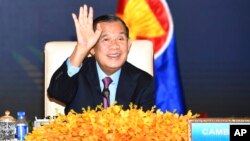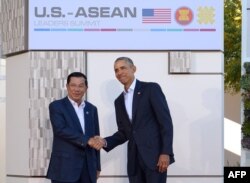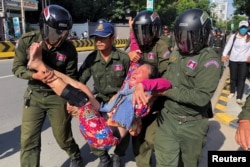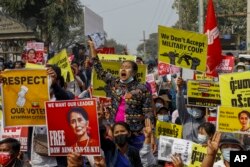WASHINGTON — Prime Minister Hun Sen can expect an angry crowd to greet him outside the White House for the US-ASEAN Summit next week, but once inside critics worry the conversations will focus on geopolitics over human rights and democracy, giving the premier a much-desired dose of international legitimacy despite his ongoing crackdown at home.
“Inside the U.S.-ASEAN Summit, the criticism of Cambodia would be limited,” Harish Mehta, author of the book “Hun Sen: Strongman of Cambodia,” told VOA Khmer by email. “But outside the Summit, we can expect US media, Senators, Congress and civil society to come down heavily on the Hun Sen government.”
Mehta, editor-in-chief of the Rising Asia Journal, added that President Biden would raise the issue of democracy as part of his global push against authoritarianism, and likely call out Myanmar’s junta.
“But beyond that, there’s really not much that the United States can ever do because many ASEAN member states are under authoritarian rule, or are states where free elections are not held,” Harish Mehta said.
A draft schedule of events for the May 12-13 summit obtained by VOA Khmer says that Biden will be joined by Vice President Kamala Harris and congressional leaders in welcoming Hun Sen and fellow ASEAN leaders to Washington, for the first summit of its kind since the Obama administration.
Hun Sen, as the current chair of ASEAN — a rotating position passed between members — will officially co-chair the summit with Biden. The gathering is part of a wider U.S. effort to counter China’s influence in the Indo-Pacific, a foreign policy priority for the president and congressional lawmakers on both sides of the political aisle.
The administration adopted an Indo-Pacific Strategy in February that prioritizes investments in democratic institutions, a free press, and vibrant civil society, noted Joanne Lin Weiling, a lead researcher at the ASEAN Studies Center at ISEAS Yusof Ishak Institute in Singapore.
“However, the US is also aware of the diverse governance and political systems across Southeast Asia and it is unlikely to preach at length about the values of democracy or human rights when there are other more critical agendas to discuss such as regional and international issues like the South China Sea, the crisis in Ukraine and the situation in Myanmar among many others,” she said in an email to VOA Khmer.
“The US has also on its plate a request for a Comprehensive Strategic Partnership status with ASEAN. Therefore, it is important for the US not to make any ASEAN countries upset otherwise it may risk not getting it this year,” Joanne Lin Weiling added, noting the event also could be a good opportunity for Cambodia and the US to repair strained relations.
The U.S. has repeatedly called for Cambodia’s government to restore the opposition CNRP and warned that the legitimacy of its elections could be at risk if it doesn’t. It has also sanctioned top officials involved in China’s development of the Ream naval base, which has become a flashpoint in the regional US-China rivalry, sparking Cambodian claims of interference in its affairs.
Phil Robertson, deputy director of Human Rights Watch in Asia, told VOA Khmer that the US should use the summit to speak out publicly and privately about how countries like Cambodia, Thailand, and others are falling well short of their commitments on human rights.
“Cozying up to Southeast Asian dictators is not the correct way for the US to combat China’s influence in the region,” Robertson said. “The US needs to offer a clear alternative, holding out the model of good governance where rights are respected, and democratic principles are upheld.”
Robertson criticized Kurt Campbell, the White House’s Indo-Pacific coordinator, for apparently thinking an invite to the White House could win over ASEAN leaders seeking to balance their relations with the West and China — adding that the long-term American focus should be on the region’s people, not its leaders.
“Even though many of the ASEAN member state governments are dictatorships, the hopes of the people for reform and rights should be where the US places its bets for a better tomorrow,” Robertson said.
The ASEAN bloc includes 10 countries with a combined population around 650 million people. It represents the fourth-largest export market for the U.S., with trade almost doubling in the past decade to $352 billion in 2021, according to the US-ASEAN Business Council.
Ear Sophal, associate dean for Undergraduate Programs and Global Development at Arizona State University, said there will be room for agreements and disagreements at the summit, but that it could also be an opportunity for Hun Sen to relieve some of the diplomatic pressure that has been building since the ruling party began its crackdown on dissent in 2017.
“This is inevitable, when elevated to the same stage as President Biden,” said Ear Sophal, author of the book “Aid Dependency in Cambodia: How Foreign Assistance Undermine Democracy.”
“The Selfie with Biden will be done. The money shot in front of the White House will be taken. This is about photo ops when it comes to the PM, but let's hope he brings Biden a real gift: opposition leader whose case is dropped; political prisoners who are set free,” said Ear Sophal.
“Of course, you don't want to upset your host (the U.S.) or your guests (ASEAN members). But some truth will be spoken: Myanmar has made no progress; the Foreign Minister of Malaysia is talking to the shadow government. Thailand used to be pro-US. Now it's neutral leaning even a bit towards China. And it certainly suffers from problems of legitimacy when it comes to democracy,” Ear Sophal added.
Some dozen human rights groups from countries including Cambodia and Myanmar sent a joint letter on April 24 pressing Biden to take a firm stance against their ruling regimes.
“Mr. President, we have confidence that under your administration's leadership, the world community and ASEAN will come to the aid of the people to stop the dictators' reign of impunity, and find lasting freedom, justice, democracy, and the rule of law for Cambodia,” the letter read.
Cambodian dissidents will deliver a similar message at a demonstration against Hun Sen in Washington, D.C on May 12, said Rithy Ung, chief of CNRP in the U.S., who lives in Lowell, Mass. Many Cambodian immigrants and former refugees are expected to travel to Washington from multiple states to publicly share their views.
Given the summit is on a weekday, Rithy Ung said he does not know how many people will turn out, but he expected a mixed group of protesters representing communities from Cambodia, Myanmar and others advocating for democracy and human rights in Asia.
Sok Eysan, a ruling Cambodian People’s Party senator in Phnom Penh and spokesman, said it's normal that opponents demonstrate in a free country like the U.S.. He said that prime minister would also have supporters waiting for him in Washington D.C. He also called the summit “historic” and “highly prestigious for Cambodia,” noting that Cambodia’s political situation was not on the agenda.
Stephanie Arzate, a spokesperson for the U.S. Embassy in Cambodia, said the Biden administration was focused on both “ASEAN centrality” and encouraging democracy and respect for human rights.
“The U.S.-ASEAN Special Summit will commemorate 45 years of U.S.-ASEAN relations and demonstrate the United States’ enduring commitment to ASEAN centrality in delivering sustainable solutions to the region’s most pressing challenges,” she said in an email to VOA Khmer. “Encouraging democracy and respect for human rights is central to U.S. foreign policy around the world, including with ASEAN.”
Chheang Vannarith, executive president of Asian Vision Institute in Cambodia, said this month’s summit would focus largely on US-ASEAN cooperation in rebuilding economies following the damage done during the COVID-19 pandemic.
“The most important matter is to jointly build a social economy after Covid-19 pandemic, to strengthen architecture of security and an open regional economy,” he said. While democracy and human rights would continue to be pillars of U.S. foreign policy, he pointed to deepening ties with Vietnam, despite political differences, as evidence of a broader U.S. strategy.
“So we can say that geopolitics and economic interests are leading interests in U.S. foreign policy in the Indo-Pacific region,” Chheang Vannarith said.










